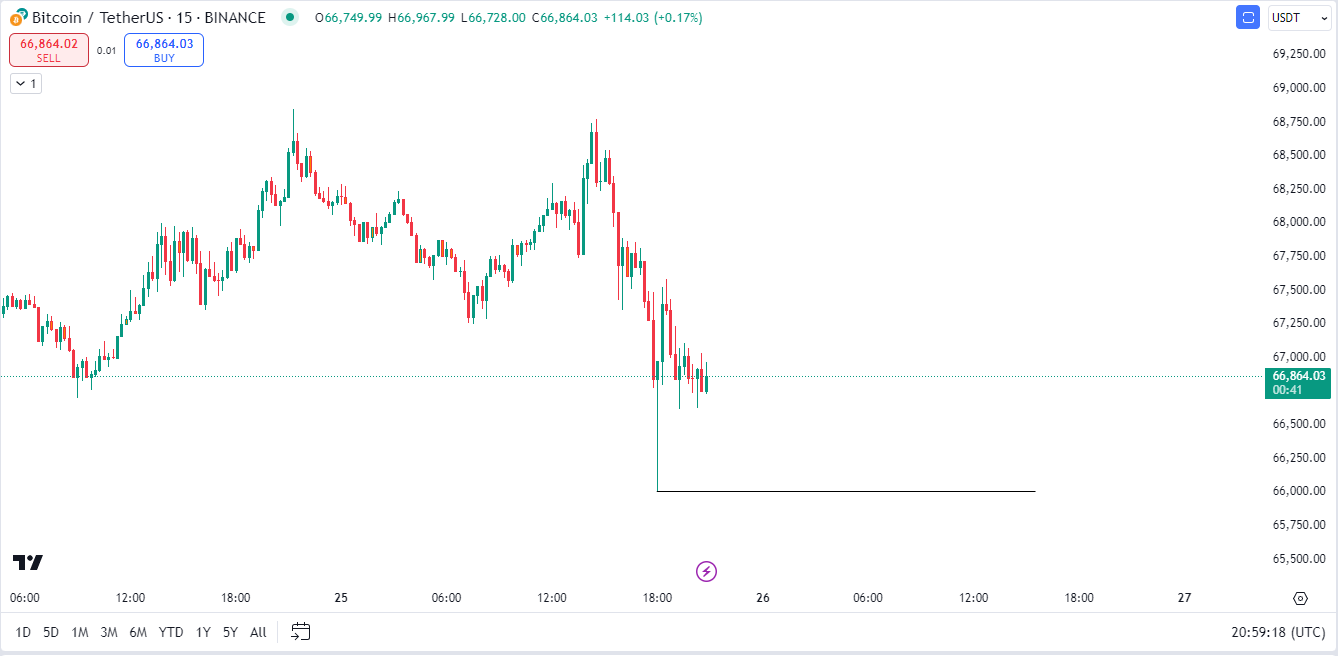The news of another potential investigation of Tether, Inc. caused another market-wide crash, just as Bitcoin (BTC) and Ethereum (ETH) were sitting on peak open interest. Most coins and tokens slumped, while USDT moved slightly down to $0.99, within its usual range of fluctuations.
Tether, Inc. is a hot topic that always affects the crypto market. The fate of the most abundant and liquid stablecoin can sway all prices at the slighted mention of FUD. The news of a new investigation led to a market-wide crash, pressuring Bitcoin (BTC) under $67,000.

Both USDT and USDC, the most widely used stablecoins, moved to $0.99, within their usual range of fluctuations. Altcoins and tokens lost less than 5% and also immediately started climbing after the initial dip.
Long liquidations immediately accelerated for BTC, attacking the built-up liquidity. The downward price move wiped out the buildup of liquidity around $67,000, which weighed down on BTC in the past day.
The initial market reaction extended the past day’s liquidations. Up to $1 billion in BTC open interest was wiped following the news, with the crypto market cap dropping about $5B in less than an hour.
The market, however, had enough upward momentum, so some of the assets immediately bounced from the lows. BTC dipped to the $66,000 level, then moved up close to $66,700 within minutes. ETH dipped to $2,461.41 and also looks prepared to return to a higher range.
Overall, traders took the new Tether FUD as a minor event, even if the market effect was intentional. Despite the fears, USDT has served the crypto market for more than a decade with only a handful of de-pegging events. Traders even considered the Tether news to be one last attempt at a shakedown before a renewed rally.
The Tether news arrived at a time when BTC was trying to pick a direction and was sitting on accumulated long positions. As those positions were cleared, there is now a smaller risk that whales or traders will try to push BTC down.
Unraveling the long positions also opens up the possibility for a weekend BTC rally. Within an hour, accrued long positions were flushed, coinciding with options expiry. While some traders believed the Tether FUD was meant to stop the BTC rally, in the end, it may have the opposite effect, as long positions are no longer attackable.
The sudden market move and Tether FUD affected DeFi on Solana. The Raydium concentrated liquidity pair suffered a series of failed transactions in the minutes after the market crash. The liquidity pool is supplied with disparate amounts of USDT and USDC, so not all swaps are going through. For a brief period, all transactions fell through, some due to insufficient liquidity. However, the effect on DeFi may be minor and temporary.
Ethereum-based DeFi is not threatened by liquidations at these price levels, as all protocols retain healthy collaterals.
Tether FUD dismissed as noise
For some, the Tether news is simply FUD, which has helped clear some of the bloated liquidity from the market. The news will accelerate the price moves ahead of Bitcoin’s monthly options expiration. Tether’s CEO Paolo Ardoino stated that the news of a lawsuit was just a new wave of FUD, but that was enough for a jittery market to react.
Tether has already survived a lawsuit and a deep investigation by the New York Attorney General and has continued to function and inject new USDT. The stablecoin issuer has tried to be compliant and has been compliant with investigations in cases of fraud and theft.
Tether also verifies its user accounts, but holding the tokens is still anonymous and permissionless. Not all wallets are vetted, and USDT is used on multiple networks with no oversight. Tether mentioned the news of AML’s non-compliance goes against its track record of complying with authorities in tracking bad actors.
 cryptopolitan.com
cryptopolitan.com